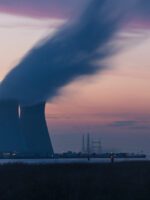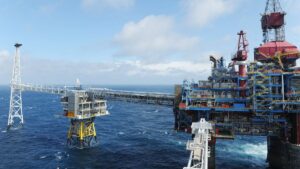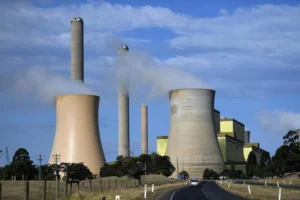The US Navy has just flipped the switch on its latest solar power venture, a 13.8-megawatt behemoth at its vast China Lake research center in the Mohave Desert. The Navy’s new China Lake Solar Power Plant is expected to save about $13 million per year in electricity costs, accounting for about 30 percent of the facility’s annual electricity usage. Amazingly, there were virtually no up-front costs for the Navy and the entire thing didn’t cost taxpayers one thin dime.
Navy solar power for nothing
If you’re familiar with the commercial solar industry, the Navy’s ability to get “free” solar power is no mystery. The China Lake plant was constructed under a power purchase agreement (PPA) with SunPower Corp. in which SunPower got the right to install its solar panels on Navy-owned land, and in return the Navy agreed to buy electricity generated by the panels.
Under the agreement, the price of the solar-generated electricity is much lower than the price the Navy was paying for grid-supplied electricity, and that’s where the savings comes in.
The new installation uses the SunPower Oasis™ Power Plant product, which is designed as a fully integrated, pre-assembled module. That pretty much accounts for how the plant just broke ground last January and here it is up and running in less than a year.
US National Defense transitions to clean energy
The Navy’s PPA model is the same one that thousands of building owners have been using to get rooftop solar panels installed without paying up-front costs. That’s an ideal arrangement for government properties, since it virtually eliminates the need for politically sensitive taxpayer investments.
In that regard, while China Lake apparently makes the U.S. Navy the first branch of the armed services to complete this type of PPA solar power installation, it is just the first drop in a flood of new PPA projects coming down the pipeline.
Last year, the Army launched the Energy Initiatives Task Force, with the goal of fast-tracking utility-scale, PPA solar power projects and other clean energy ventures on Army property.
That initiative got bumped up to another level just a couple of months ago, when DoD entered into an agreement with the Department of the Interior to conduct a systematic investigation leading to new clean energy projects on military property.
China Lake comes into its own
According to a Navy article about clean energy innovation at China Lake, SunPower’s new installation is the culmination of more than 30 years of experimentation that began in the 1970′s, when the first major oil supply crisis hit the U.S.
The Navy’s earlier clean energy projects at China Lake included electric vehicles, wind power, trash-to-gas, as well as photovoltaic panels.
In 2002 (yes, under the Bush Administration), China Lake stepped up its clean energy game with the installation of a prototype for regenerative fuel cells, a technology that is finally breaking into commercial use today. A regenerative fuel cell runs on hydrogen and oxygen, which are manufactured by subjecting water to an electric current that is in turn generated by solar panels.
China Lake is involved in the Navy’s biofuel research initiatives and it also boasts a geothermal plant that dates back to the 1980′s.
As an aside, if the name SunPower rings a bell, you might be thinking back to last fall, when Fox News began pushing a storyline that SunPower was headed for a scandal “even bigger than Solyndra.”
That line was quickly dropped, though, perhaps because SunPower happens to be the same outfit that installed the new solar panels on the headquarters of Dow Jones, Fox’s sister company in the Murdoch media empire.
![]() Clean Technica (http://s.tt/1qAyi) – Reproduced with permission.
Clean Technica (http://s.tt/1qAyi) – Reproduced with permission.










